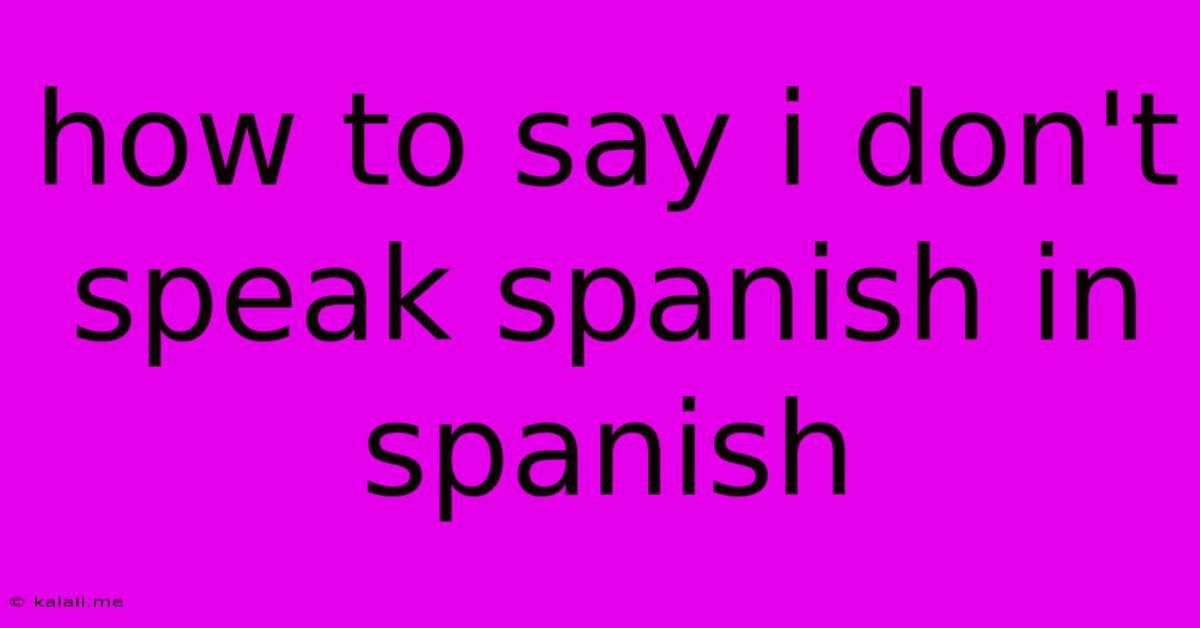How To Say I Don't Speak Spanish In Spanish
Kalali
May 24, 2025 · 3 min read

Table of Contents
How to Say "I Don't Speak Spanish" in Spanish: A Guide for Travelers and Learners
So, you're venturing into a Spanish-speaking country or interacting with Spanish speakers, and you need a way to politely let them know you don't speak their language. Knowing how to say "I don't speak Spanish" in Spanish is a crucial phrase for any traveler or language learner. This simple phrase can prevent misunderstandings and open doors to more effective communication. This guide will equip you with several ways to express this, from the most basic to more nuanced options.
Why is it Important to Know This Phrase?
Knowing how to politely state your language limitations is essential for clear communication. It avoids awkward situations and allows the other person to respond appropriately, perhaps switching to English or another language you share. It shows respect and avoids any frustration caused by a language barrier.
The Basic Phrase: "No hablo español."
The most straightforward and commonly used way to say "I don't speak Spanish" is "No hablo español." This translates literally to "I don't speak Spanish." It's simple, effective, and widely understood. This is a great starting point for anyone new to the Spanish language.
Adding Politeness: "No hablo español, lo siento."
To add a touch of politeness, you can include "lo siento," which means "I'm sorry." This makes your statement softer and more considerate. The complete phrase is "No hablo español, lo siento." This translates to "I don't speak Spanish, I'm sorry." This is a very common and well-received way to express your language limitations.
More Formal Options: "No entiendo español." and "Disculpe, no hablo español."
For more formal situations, such as interacting with professionals or older generations, you could use slightly different phrases. "No entiendo español" means "I don't understand Spanish." This focuses on comprehension rather than speaking ability. Alternatively, "Disculpe, no hablo español" adds a formal apology ("Excuse me") before stating that you don't speak Spanish. This shows extra respect and is appropriate for professional or formal contexts.
Asking for Help: "¿Habla inglés?"
Often, simply stating you don't speak Spanish isn't enough. Immediately following your statement, it's helpful to ask if the person speaks another language you understand. The most common follow-up question is "¿Habla inglés?" which means "Do you speak English?" This proactive approach facilitates communication and showcases your effort to bridge the language gap.
Beyond the Basics: Expanding Your Communication Skills
While learning these phrases is a fantastic first step, consider learning other essential phrases like "hello" (hola), "thank you" (gracias), and "please" (por favor). Even knowing a few basic words can go a long way in showing your willingness to communicate, even with limited Spanish abilities. This demonstrates cultural sensitivity and enhances your interactions. Consider using language learning apps or resources to expand your vocabulary and conversational skills.
Conclusion:
Learning how to say "I don't speak Spanish" in Spanish is a valuable skill for anyone interacting with Spanish speakers. This guide has provided several options, from the simple and direct to more polite and formal alternatives. Remember to combine this phrase with a request for assistance in another language to ensure effective communication. Happy travels!
Latest Posts
Latest Posts
-
Xcan You Assign Materials With Mirror Modifier Blender
May 24, 2025
-
How To Remove Deadbolt With No Screws
May 24, 2025
-
Melted Plastic On Glass Top Stove
May 24, 2025
-
Destruction Of Jerusalem In The Bible
May 24, 2025
-
How To Fill Propane Tank From Home Tank
May 24, 2025
Related Post
Thank you for visiting our website which covers about How To Say I Don't Speak Spanish In Spanish . We hope the information provided has been useful to you. Feel free to contact us if you have any questions or need further assistance. See you next time and don't miss to bookmark.